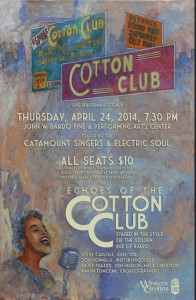Imagine it’s 1927 in the Harlem district of New York City during prohibition. Alcohol is illegal, but it’s easy to pay off the police in the mainly black district. Owney “The Killer” Madden, an English gangster, owns a club that is only the rich white clientele can enter called the Cotton Club. It employs solely black entertainers and waitstaff. The club was bought to be able to sell Madden’s bootlegged whiskey, and it sold well to its upper class clients like CBS sportscaster Ted Husing.
This evening’s brand new house band is a name that no one in the room will recognize. The group is from Washington, D.C. and they’re playing jazz music – another taboo on top of the bootlegged whiskey, and being white in a black neighborhood.
The front man of the band’s name? Duke Ellington.
That is where the story of “Echoes of the Cotton Club” begins. “Echoes of the Cotton Club” is an original adaptation by a production team that includes Steve Carlisle, Bruce Frazier, Karyn Tomczak, Jon Henson and Don Connelly. It will be performed in the John W. Bardo Fine and Performing Arts Center for one night only. It is a live radio broadcast to be performed by an all-volunteer cast at 7:30 p.m. on Thursday, April 24.
“Duke Ellington said many times throughout his life that it was radio that catapulted him to such popularity and prominence. He could have toured for years and not received that kind of impact, not have grown that big, as other bands had done. So, you combine his inherent talents with the music and with the radio, and suddenly, it just explodes across the country, and Duke Ellington becomes this big name,” said Connelly. “Just about every artist that played in the Cotton Club becomes these big national stars, and the music that was created there, the echoes of the club, are the musical styles that to this day follow in the footsteps of the cotton club. In other words, some of the music that people are gonna hear by Bruno Mars can trace its rhythmic history back to the Cotton Club and back to Duke Ellington.”
“Echoes of the Cotton Club” may begin in the severely racist 1920s, but according to Connelly, it “hops generationally between different generations. It’s not chronological. We come out of the Duke Ellington medley with Mercedes Ellington talking about her grandfather, and then she introduces another young man who was becoming a music legend who was Stevie Wonder. . . There’s a 50 year jump right there, but then we jump, go back, and we’re all over the place time-wise.”
Mercedes Ellington is the granddaughter of Duke Ellington as well as being the president of the Duke Ellington Center for the Arts. She is also an internationally known choreographer and dancer. She is unable to be on campus for the performance, but has pre-recorded her segments of the show.
Every song selected for this show is or was a number 1 hit on the radio at one point in time, according to Carlisle. It will feature performances from WCU’s Catamount Singers and Electric Soul.
“It’s just a group of artists that come together to do something creative that’s a little out of the ordinary,” according to Connelly.
The show has been registered for the Kennedy Center American College Theater Festival, which means that, “There will be two people here for the show night. They will watch the show. Afterwards they will come back and they will give feedback – they’re called respondents because they respond to the show. They’re not critics, they’re respondents. They will give the students, the staff, the faculty involved feedback about the show. If they feel it was significant enough, if they recommend that it go to the regional, then next spring in February, we’ll present the show at whatever university the regional is being held in. It would be again judged and if it should go from the regional, it would go to the Kennedy Center in Washington DC where it would be presented as part of the Kennedy Center College Theater Festival. “
Tickets for the event are $10 and all of that money goes directly back into student scholarships for the participating departments. Doing this show will put the departments over the $25,000 mark for money raised for scholarships through the live radio broadcasts. Tickets can be bought at the Bardo Arts Center box office in person or online at bardoartscenter.wcu.edu, or call the box office at 828-227-2479.




